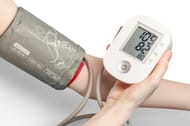Pregnancy-induced hypertension can be referred to as unusually high blood pressure during gestation.
The condition is also known as gestational hypertension. Complications during pregnancy can be fatal, and high blood pressure during pregnancy increases the risk significantly.
Identifying the signs and symptoms during the early stages of pregnancy can help with the management of the condition. In this article, we bring you all about gestational hypertension along with a list of its symptoms.
Cause of pregnancy-induced hypertension

The exact cause of gestational hypertension is unknown, but it's believed that several underlying conditions lead to this problem. Risk factors associated with hypertension play a key role in the pathophysiology of the condition.
People with existing conditions are at a higher risk, as many medical conditions lead to increased blood pressure. If you are suffering from any medical condition, consult your doctor immediately.
Complications of pregnancy-induced hypertension
Complications depend on the type of condition and past medical history. Gestational hypertension can arise from prevailing chronic conditions as well.
High blood pressure before pregnancy can continue after the baby is born and can be considered chronic. Chronic hypertension can also lead to preeclampsia, which is discussed below.
Pregnancy-induced hypertension, which is observed in the later stages of pregnancy, can develop into preeclampsia. Regular observation is important to provide proper medical assistance, and the mother needs to visit the doctor more often.
Preeclampsia is a condition that's only found usually after 27 weeks of pregnancy. Elevated blood pressure readings and protein in urine can lead to the diagnosis. It can also affect the placenta, liver, kidneys, lungs or brain. Seizures (eclampsia) can occur when the condition affects the brain.
Pregnancy-induced hypertension risk factors
You may be more likely to experience gestational hypertension if you:
- Are under the age of 20 or over the age of 40
- Have suffered from gestational hypertension or preeclampsia in the past
- Have a family history of pregnancy-induced hypertension
- Have diabetes
- Have lupus
- Have kidney disease (both chronic and acute)
- Are expecting twins, triplets or more babies
These risk factors must be kept in mind before planning a pregnancy, and precautions must be taken to prevent such conditions.
Pregnancy-induced hypertension symptoms

Some common signs and symptoms of gestational hypertension are:
- Swelling (edema).
- Headaches.
- Unexplained weight gain.
- Vision issues
- Nausea or vomiting.
- Less urine production.
- Abdominal pain.
As many of these symptoms are common to many other conditions, it's important to get diagnosed by a doctor.
Your doctor might prescribe several blood tests to confirm any underlying conditions that might be the cause behind pregnancy-induced hypertension. Blood pressure should ideally be “120 over 80” (systolic blood pressure over diastolic blood pressure).
Urine tests can also be performed to check for proteins, which could give an insight into the severity of the condition. Tests related to liver, kidney and blood-clotting factors can also help with the diagnosis. A hypertension diet can also help manage the condition.
Pregnancy-induced hypertension treatment

Medications to manage blood pressure are usually prescribed by doctors. Monitoring blood pressure at home is essential for proper management.
In case of severe conditions, injections of blood pressure-lowering medication are required. Usually, hospitalization is necessary in such situations. Timely management and medical intervention can prevent any mishaps.
Indranil Biswas is a nutritionist and personal trainer with a diploma in dietetics and personal training with a specialization in sports nutrition and strength training.
What do you think of this story? Tell us in the comments section below.
